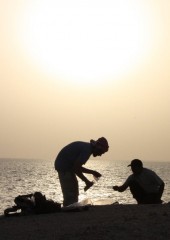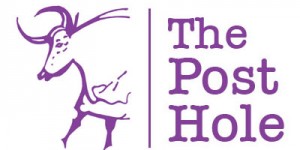In Issue 19, four current Year 3 students gave a brief outline of their dissertation topics in the hope of helping those in other years still trying to decide what to do. Here two current Masters students on the Historical Archaeology path give similar advice...
Buildings Archaeology by Cath Poucher
As a renowned 'buildings nerd' in the department since my first year of undergraduate, I may be a little biased in writing an objective account of the subject. While the course is certainly a different level of work compared to undergraduate it is fair to say that you get out what you put in. Despite this, pace yourself and plan your time well - the days of leaving essays until the last minute are over. Get a diary and be prepared for ten weeks full of work! Scary as this may sound, many postgraduate students manage a full time MA and hold down a job, but I would advise focussing on getting experience in the field — internships and borrowing survey equipment is by far a better use of time in the long run.
Structure
The Masters courses are structured very clearly. An MA in Buildings Archaeology is split into two terms of modules, each term containing:
- One core module - Analysing Historic Buildings in the autumn, and Interpreting Historic Buildings in the spring;
- One option module — this is another degree's core module, allowing you to broaden your knowledge and specialisations;
- Two skills modules — they do as they say on the tin and allow you to develop your archaeological skills.
The core modules for Buildings Archaeology are lecture based, with the occasional field trip which is always fun but does take up whole days. For these there are two essays; a formative and a summative, both more substantial than those in an undergraduate degree. The options modules are a fantastic way of broadening your skills, but again they have two essays, so be aware of the workload. The recommended option modules are Cultural Heritage Management, Conservation, Landscapes, Medieval Archaeology, and Historical Archaeology. The recommended skills modules are Narrating Our Pasts, Topographical Survey, Buildings Survey, Characterisation (which is new to next year), Legislation and Policy, Geographical Information Systems (GIS), Virtual Reality Modelling, and Conservation Solutions, each with some form of assessment. This assessment, along with your essays and possible presentations (depending on your chosen option module) make for a great deal of work, and shows the need for excellent time management and a calm head!
Problems
The main problems that could be faced are choosing your option modules. It is vital that you choose your modules based on where you want to go with your future career. For example, if you want to work in the public representation and heritage of buildings then Cultural Heritage Management is a good choice. Work in the conservation and preservation of buildings would lead you to choose Conservation. It is really important that you understand the modules and what they contain, so talk to a Masters student (such as myself) to understand what would be best for you.
The second problem is attributed to workload. The skills modules can be full days or sometimes two at a time. When you have a presentation and two essays to do, this can seem like too much. The only way of overcoming this is to manage your time well, and pick the right skills for you, which will make the sacrifice more bearable.
The only thing left to say is good luck with your applications, try to take advantage of the survey equipment while here to gain experience, and enjoy it — even if it is really stressful!
Historical Archaeology by Mike Emra
Having been an undergraduate at University of York, I knew the Department well; the friendly atmosphere, strong research pedigree, and the academic interests of researchers and staff. I decided to stay because those are the things I wanted out of my continuing Higher Education, and the city of York was very much the type of place I wanted to live.
I chose to pursue a Masters degree because it is an essential stepping-stone to a career in Academia, for whatever reason I wish to pursue it. I feel that we, as students of the past, are enabled to understand it to a greater extent than the wider public — purely because we have the time to devote to stratigraphy, wear-use patterns and documentary archives. But what is that knowledge without being shared? One of York's strengths is in collaboration, within the academy and with the community, and as a socially minded archaeologist (as we all should be) I wanted to be part of that dynamic knowledge exchange.
I have found, in the term or so I have been a Masters student here, that I am not just studying Historical Archaeology as my enrolment suggests. I am studying landscapes, buildings, artefacts, computer technology, cultural heritage management and community engagement. The modular structure means I am constantly in contact with other sub-disciplines, and people who come from different backgrounds and viewpoints. That diversity drives excellent teaching, learning and research; it is the absolute cornerstone of holistic archaeological approaches, and has been one of the defining characteristics of my study at York.
This has benefited no doubt from York's position as something of a research crossroads. It is a major centre for all three wings of archaeological practice — Humanities, Science and Cultural Heritage, and cross-pollination is inevitable and welcome.
One year is not a lot of time to do this in, though. There is substantial work, and with that substantial pressure. Not just for the presentations, essays and assessments you are obliged to complete, but because, for me, I am in an intermediary phase — there is pressure to be outstanding, unique and different. This should not deter anyone wishing to pursue higher education further, because no one should be surprised it is hard work — certainly no-one will tell you it is not. Just as with moving from first to second year, and second to third the workload, and the expectation increases, and so does your ability. You adjust.
Being able to keep up is about being engaged. York has to be the right place for you personally, and academically. It has to be offering what you are interested in, but the Department must also be interested in what you can offer. Despite its diversity York cannot be all things to all men, as nothing really can. But versatility, and being multi-skilled is, I feel, all the more important in these difficult economic climes, and is only going to be increasingly so. As an archaeologist who has consistently plucked from the schmorgasboard offered at York, I can see how one thing flows into the other, how concepts and themes intermingle, and I feel that is a valuable tool for a credible researcher, and probably for commercial practice too.




